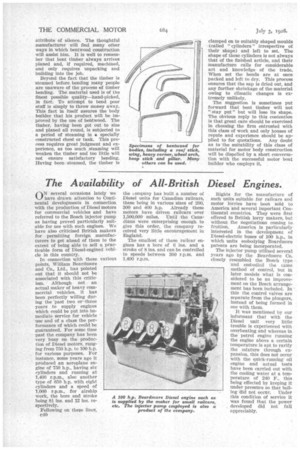The Availability of All-British Diesel Engines.
Page 62

If you've noticed an error in this article please click here to report it so we can fix it.
OO several occasions lately we have drawn attention to Continental developments in connection with the production of Diesel motors for commercial vehicles and have referred to the Bosch injector pump as having proved particularly suitable for use with such engines. We have also criticised British makers for permitting foreign manufacturers to get ahead of them to the extent of being able to sell a ticable form of Diesel-engined cle in this country. pracvehi In connection with these points, -William Beardmore and Co., Ltd., has pointed out that it should not be associated with this criticism. Although not an actual maker of heavy commercial vehicles, it has been perfectly willing during the 'past two or-three years to supply engines which could be put into immediate service for vehicle use and of a class the performance of which could be guaranteed. For some time past the company has been very busy on the production of Diesel motors, ranging from 750 h.p. to 100 h.p. for various purposes. For instance, some years ago it produced an aeroplane engine of 750 h.p., having six cylinders and running at
1;400 also another type of 650 h.p. with eight cylinders and a speed of 1,000 r.p.m., for airship work, the bore and stroke being 81ins. and 12 ins. respectively.
Following on these lines, c40 the i:ompany has built a number or Diesel units for Canadian railcars, these being in various sizes of 200, 300 and 400 Already these motors have driven railcars • over 1,500,000 miles, Until the Canadians were enterprising enough to give this order, the company received very little encouragement in England.
The smallest of these railcar engines has a bore of 6 ins. and a stroke of 8 ins, and can be controlled to speeds between 300 r.p.m. and 1,400 r.p.m.
Rights for the manufacture of such units suitable for railcars and motor lorries have been sold to America and several important Continental countries. They were first offered to British lorry makers, but without the negotiations coming to
fruition. America is particularly interested in the development of Diesel-electric buses of 100 h.p., in which units embodying Beardmore patents are being incorporated.
The injector pump utilized several years ago by the Beardmore Co. closely resembled the Dosch type -and embodied the came method of control, but in later. models what is considered to be an improvement on the Bosch arrangement has been included. In this the control valves are seorate from the plungers, instead of being formed in one with them.
It was mentioned by our informant that with the Diesel unit very little trouble is experienced with overheating and whereas in the petrol engine running the engine above a certain temperature is apt to rarity the mixture through expansion, this does not occur with the quick-running oil engine and actual tests have been carried out with the cooling water at a temperature of 240 F., this being effected by keeping it under pressure so that boiling did not occur. Under this condition of service it was found that the power developed did not .fall appreciably.












































































































